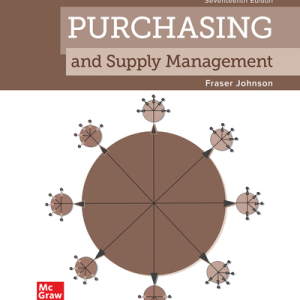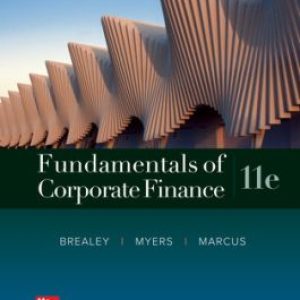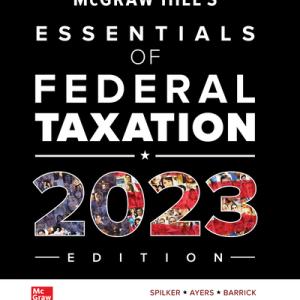Solution Manual
Managerial Accounting, 18th Edition By Ray Garrison, Eric Noreen and Peter Breuwer Solution Manual
Dive into managerial accounting mastery with the 18th Edition Solution Manual by Garrison, Noreen, and Breuwer. Expertly crafted insights for success in your studies
Original price was: $80.00.$35.00Current price is: $35.00.
Managerial Accounting, 18th Edition By Ray Garrison, Eric Noreen and Peter Breuwer Solution Manual
ISBN10: 1266634509
ISBN13: 9781266634505
ISBN13: 9781266634505
Table of Contents for Managerial Accounting Solution manual
- ChapterOne: Managerial- Accounting and Cost Concepts
- ChapterTwo: Job-Order Costing: Calculating Unit Product Costs
- ChapterThree: Job-Order Costing: Cost Flows and External Reporting
- ChapterFour: Process Costing
- ChapterFive: Cost-Volume-Profit Relationships
- ChapterSix: Variable Costing and Segment Reporting: Tools for Management
- ChapterSeven: Activity-Based Costing: A Tool to Aid Decision Making
- ChapterEight: Master Budgeting
- ChapterNine: Flexible Budgets and Performance Analysis
- chapter ten: Standard Costs and Variances
- ChapterEleven: Responsibility Accounting Systems
- ChapterTwelve: Strategic Performance Measurement
- ChapterThirteen: Differential Analysis: The Key to Decision Making
- ChapterFourteen: Capital Budgeting Decisions
- ChapterFifteen: Statement of Cash Flows
- ChapterSixteen: Financial Statement Analysis
Sample for the Solution manual
Chapter 1
Managerial Accounting and Cost Concepts
Questions
- The three major types of product costs in a manufacturing company are direct materials, direct labor, and manufacturing overhead.
- Direct materials are an integral part of a finished product and their costs can be conveniently traced to it.
- Indirect materials are generally small items of material such as glue and nails. They may be an integral part of a finished product but their costs can be traced to the product only at great cost or inconvenience.
- Direct labor consists of labor costs that can be easily traced to particular products. Direct labor is also called “touch labor.”
- Indirect labor consists of the labor costs of janitors, supervisors, materials handlers, and other factory workers that cannot be conveniently traced to particular products. These labor costs are incurred to support production, but the workers involved do not directly work on the product.
- Manufacturing overhead includes all manufacturing costs except direct materials and direct labor. Consequently, manufacturing overhead includes indirect materials and indirect labor as well as other manufacturing costs.
- A product cost is any cost involved in purchasing or manufacturing goods. In the case of manufactured goods, these costs consist of direct materials, direct labor, and manufacturing overhead. A period cost is a cost that is taken directly to the income statement as an expense in the period in which it is incurred.
- Variable cost: The variable cost per unit is constant, but total variable cost changes in direct proportion to changes in volume.
- Fixed cost: The total fixed cost is constant within the relevant range. The average fixed cost per unit varies inversely with changes in volume.
- Mixed cost: A mixed cost contains both variable and fixed cost elements.
- Unit fixed costs decrease as the activity level increases.
- Unit variable costs remain constant as the activity level increases.
- Total fixed costs remain constant as the activity level increases.
- Total variable costs increase as the activity level increases.
- Cost behavior: Cost behavior refers to the way in which costs change in response to changes in a measure of activity such as sales volume, production volume, or orders processed.
- Relevant range: The relevant range is the range of activity within which assumptions about variable and fixed cost behavior are valid.
- An activity base is a measure of whatever causes the incurrence of a variable cost. Examples of activity bases include units produced, units sold, letters typed, beds in a hospital, meals served in a cafe, service calls made, etc.
- The linear assumption is reasonably valid providing that the cost formula is used only within the relevant range.
- A discretionary fixed cost has a fairly short planning horizon—usually a year. Such costs arise from annual decisions by management to spend on certain fixed-cost items, such as advertising, research, and management development. A committed fixed cost has a long planning horizon—generally many years. Such costs relate to a company’s investment in facilities, equipment, and basic organization. Once such costs have been incurred, they are “locked in” for many years.
- As the anticipated level of activity changes, the level of fixed costs needed to support operations may also change. Most fixed costs are adjusted upward and downward in large steps, rather than being absolutely fixed at one level for all ranges of activity.
- The traditional approach organizes costs by function, such as production, selling, and administration. Within a functional area, fixed and variable costs are intermingled. The contribution approach income statement organizes costs by behavior, first deducting variable expenses to obtain contribution margin, and then deducting fixed expenses to obtain net operating income.
- The contribution margin is total sales revenue less total variable expenses.
- A differential cost is a cost that differs between alternatives in a decision. A sunk cost is a cost that has already been incurred and cannot be altered by any decision taken now or in the future. An opportunity cost is the potential benefit that is given up when one alternative is selected over another.
- No, differential costs can be either variable or fixed. For example, the alternatives might consist of purchasing one machine rather than another to make a product. The difference between the fixed costs of purchasing the two machines is a differential cost.
Order Managerial Accounting Solution manual
on
Or on Email
and you can get the Test bank form here
What is the Test bank and Solution manual?
ANS
https://testsolutionmanual.com/faq-testbank-solution-manual/
Thank you
User Reviews
Be the first to review “Managerial Accounting, 18th Edition By Ray Garrison, Eric Noreen and Peter Breuwer Solution Manual”

Managerial Accounting, 18th Edition By Ray Garrison, Eric Noreen and Peter Breuwer Solution Manual
Original price was: $80.00.$35.00Current price is: $35.00.










There are no reviews yet.